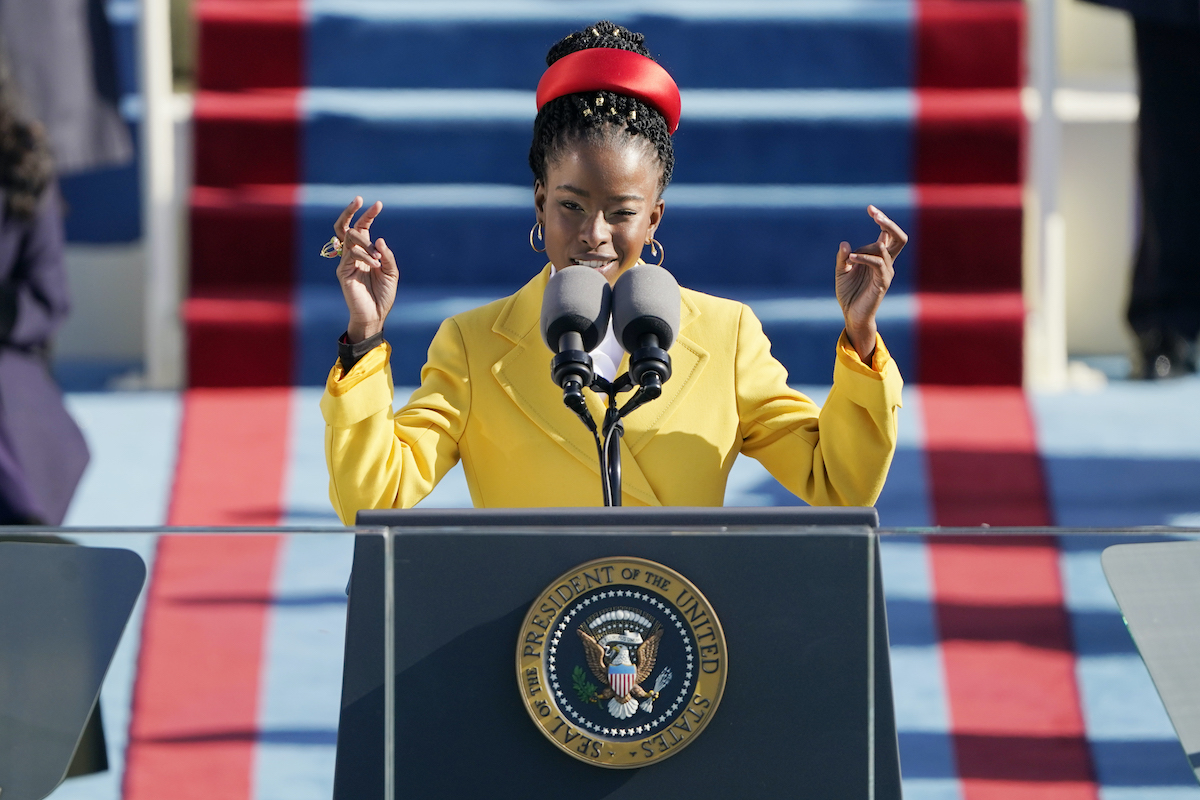Florida School Bans Amanda Gorman Poem After One Racist Parent Complained

2021 Youth Poet Laureate Amanda Gorman’s inaugural poem “The Hill We Climb” has been banned from elementary classrooms in a Florida K-8 school for clearly racist reasons—and the details of the case are illuminating when it comes to understanding the right-wing, ideologically-driven attacks on education in the state.
“The Hill We Climb“, which Gorman read aloud during Joe Biden’s presidential inauguration in 2021, is a poem that acknowledges the country’s troubled past and the difficulty of the present, while looking forward to a future of beauty, unity, and hope. Written in the wake of the January 6th insurrection and its assault on democracy, the poem includes powerful lines like “a nation that isn’t broken, but simply unfinished” and “we must first put our differences aside. We lay down our arms so we can reach out our arms to one another.”
Gorman envisions a world where America can live up to its myth, right the wrongs of its past, and serve all of its people whoever they are. “We will not march back to what was, but move to what shall be,” she writes. “A country that is bruised but whole, benevolent but bold, fierce and free.”
While it may seem incomprehensible that anyone would read messages of hate into Gorman’s poem, one parent—identified as Daily Salinas by the Miami Herald—at a K-8 school in Miami-Dade County, Florida demanded it be banned on exactly those grounds. Erroneously identifying the poem’s author as Oprah Winfrey instead of Gorman (Winfrey wrote the forward to the book version of Gorman’s poem), Salinas’ official complaint was that “The Hill We Climb” is “not educational and have indirectly [sic] hate messages” that would “cause confusion” and “indoctrinate students.”
Further, in the section of the form that asks what age group the complainant recommends being allowed access to the poem they simply answered: “not for schools.” Apparently, a poem that was read out to the entire nation during the current president’s inauguration is too dangerous for anyone who hasn’t finished high school yet to read.
Salinas also lodged similar complaints about The ABCs of Black History, Cuban Kids, Countries in the News Cuba, and Love to Langston, accusing them of containing “references of critical race theory, “indirect hate messages,” gender ideology and indoctrination”. Despite there being no other complainants, and the baffling errors made by Salinas in the complaint itself, all but Countries in the News Cuba were placed under restricted access. While middle school students are still able to access copies of the restricted books, the elementary school-age students now aren’t—even though The ABCs of Black History was specifically written for children aged five and up.
This kind of excessive age restriction being placed on challenged books, when they’re not outright banned, is increasingly common under Florida’s new “don’t say gay” law, the “Stop W.O.K.E. Act,” and other censorship-based bills. According to Stephana Ferrell, of the Florida Freedom to Read Project, this is deliberate, part of a concerted effort to raise the age at which access to books dealing with contentious or difficult topics, particularly those which “address ethnicities, marginalized communities, racism or our history of racism” is seen as appropriate. Speaking to the Miami Herald she said: “We’re seeing these topics pushed [away] from our kids at a time when they’re most accepting of our differences. This is the time to address the rougher topics in an age-appropriate way. Instead, those books are not available to them.”
It’s obvious that the accusations of “hate messages” and “indoctrination” in “The Hill We Climb” fall into the same category as the hysteria over “critical race theory” (something which has never actually been taught in American schools) and other attempts to paint any discussion of America’s problem with systemic racism as some sort of anti-white conspiracy. There are no messages of hate in Gorman’s poem, no matter how indirect the reader may imagine them to be, but there is criticism of the white supremacy that’s a key part of America’s past and present, and that’s what book banner’s don’t want children to be able to read. We all know by now the purpose of book bans, and just how easy the Florida legislation has made it for one easily offended parent to achieve them, isn’t to protect children—it’s to indoctrinate them, by strictly controlling what information and ideas they’re able to access. Freedom of thought, and children having the ability to actually explore all the relevant opinions and evidence before drawing their own conclusions, is what actually frightens these people, and what they’re so determined to prevent.
As Gorman said in her social media post, “Robbing children of their chance to find their voice in literature is a violation of their right to free thought and free speech.” Meanwhile Salinas isn’t happy with the result either. Insisting that she’s “not for eliminating or censoring any books” and instead merely wants things to be “appropriate,” Salinas maintains that they should all have been removed completely, saying library books are there “to support the curriculum of the school and I don’t see how these books support the curriculum.”
It will probably not surprise you to learn that Salinas has ties to extremist groups including the Proud Boys, having attended rallies organized by the far-right hate group.
Gorman ended her initial post with a call to action, encouraging people to speak out against book bans and to donate to and support PEN America, a hundred-year-old organization defending free expression in the United States, which is already taking action against this new wave of book bannings.
(featured image: Patrick Semansky-Pool/Getty Images)
Have a tip we should know? tips@themarysue.com